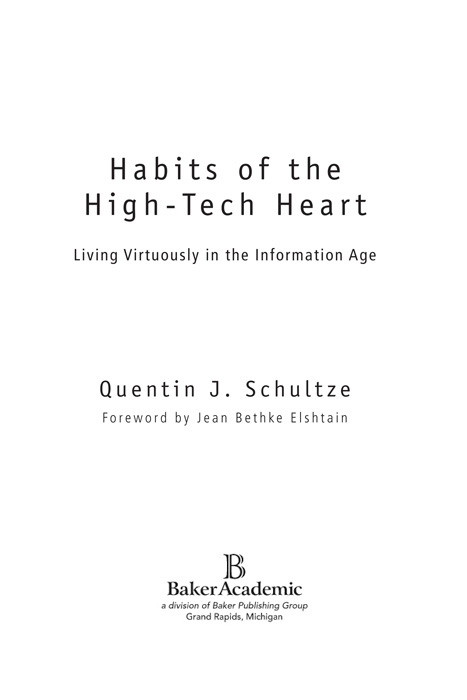
2002 by Quentin J. Schultze
Published by Baker Academic
a division of Baker Publishing Group
P.O. Box 6287, Grand Rapids, MI 49516-6287
www.bakeracademic.com
Ebook edition created 2012
All rights reserved. No part of this publication may be reproduced, stored in a retrieval system, or transmitted in any form or by any meanselectronic, mechanical, photocopying, recording, or otherwisewithout the prior written permission of the publisher and copyright owners. The only exception is brief quotations in printed reviews.
ISBN 978-1-4412-0686-2
Library of Congress Cataloging-in-Publication Data is on file at the Library of Congress, Washington, D.C.
Unless otherwise indicated, Scripture quotations are from the Holy Bible, New International Version . NIV . Copyright 1973, 1978, 1984 by Biblica, Inc. Used by permission of Zondervan. All rights reserved worldwide. www.zondervan.com
Scripture quotations identified The Message are from The Message. Copyright by Eugene H. Peterson 1993, 1994, 1995. Used by permission of NavPress Publishing Group.
This book is an open-eyed, mind-boggling, soul-piercing look at what we do to ourselves when we are not alert to our societys informationism and the symbol brokers cyber-myths of progress. Quentin Schultze asks all kinds of faithful, wise, crucial questionsand thereby offers gifts of humor, contemplation, cultural and historical memory, integrity, true justice, hope, and the right kind of fear to help us fall into humility. This book is a must read for those who love, resist, or merely use technology.
Marva J. Dawn, teaching fellow, Regent College
Technology promises virtually anything and everything. This same technology endangers virtually everything it touches. Quentin Schultzes wise and comprehensive assessment provides essential Christian discernment as we negotiate this glittering and danger-fraught landscape.
Eugene H. Peterson, translator of The Message
This book is quite a tour-de-force. Its subtitle says its about living virtuously in the information age, and thats right. Its a critique to jolt us out of technological complacency and to rethink our priorities. Habits of the High-Tech Heart speaks to an audience that should perhaps know betterits a warning; yet in the best prophetic tradition, Schultze identifies with the audience, seeing himself as one whos deeply involved in the very world he questions.
David Lyon, author of Jesus in Disneyland
The World Wide Web is both glorious and fallenlike the rest of Gods good creationand Schultze has produced a provocative, balanced, witty look at both sides of that equation. A must read for church leaders and others who want a sane guide in this minefield.
Terry Mattingly, columnist, Scripps Howard News Service
Schultze is one of those rare bilingual authors who is such a pleasure to reada master of both the digital life and the life of goodness. With wall-to-wall argument and dazzling research, were shown the path of moral discernment. This books luminous wisdom shines a spotlight on our bandwidth envy and lights up our minds and hearts at the same time.
Clifford G. Christians, research professor of communications, University of Illinois at Urbana-Champaign
Firmly based on a well-informed diagnosis of our technological times, Schultzes book is likely to be one of the most important published in the year 2002. Woe to those who ignore its message.
Lewis B. Smedes, author of Forgive and Forget
Rapid technological change is wonderful, scary, liberating, confining, upsetting, and enablingall at once. What is the responsible Christian to do in the face of such bewildering change? For a start, read this book by Quentin Schultze, and it will be a lot clearer what we should welcome, what we should oppose, and why.
Mark A. Noll, McManis Professor of Christian Thought, Wheaton College
An important, measured response to the hysterics of cyber-utopianism. Schultze deftly maps out the tricky new terrain and helps us to begin shaping a new morality for our fast new world.
David Shenk, author of Data Smog
This is a book worth listening to as we enter a broader discourse about technology that permeates our lives as much as the air we breathe. It raises important questions about what we should welcome, what we should oppose, and why. Habits of the High-Tech Heart is neither the ramblings of a Luddite nor a paean of wild-eyed utopianism. It is, rather, a well-written call to name and tame this latest development in the march of human inventiveness, before we are made into the image and likeness of the machines we have created.
John Freund, Theology Today
Well-informed and sobering.... Schultzes book serves as a thoughtful companion on the kind of comtemplative journey he advocates, and this book goes a long way toward the goal he sets for all of those who would minister in the cyber age. He implores all of us to find ways to serve responsibly and to enhance relationships with others, both online and off. Certainly these are virtuous goals for any age.
Lynn Schofield Clark, Calvin Theological Journal
To
Stephen and Bethany
Contents
Foreword
 We live in parlous times. Before the terrorist attacks of September 11, 2001, we were told repeatedly that a glorious new age of technological advance and discovery lay before us. I recall vividly participating in a discussion on the Lehrer News Hour on public television with a gentleman who had made his millions in a dot-com start-up company. When I raised the matter of a growing gap between those who are full-fledged members of the cyber-revolution and those who are being left behindas people are always left behind when new technologies take holdhis expression was one of bemusement and disdain. Clearly, I was a fuddy-duddy who wanted to stand in the way of unstoppable progress. Utopian rhetoric flowed like punch at a junior prom: The new technology would, within a short period of time, cure cancer, solve traffic jams, and usher in an era of world peace. The list seemed a bit odd, especially the world peace part. But, not to worry, the cyberage enthusiast continued, for the elements were already there. People in the global village would be bound together by consumer products. Everybody wants brand names, and this loyalty to and enthusiasm for brand names would bind people together in a way that would trump such atavistic urges as nationalism.
We live in parlous times. Before the terrorist attacks of September 11, 2001, we were told repeatedly that a glorious new age of technological advance and discovery lay before us. I recall vividly participating in a discussion on the Lehrer News Hour on public television with a gentleman who had made his millions in a dot-com start-up company. When I raised the matter of a growing gap between those who are full-fledged members of the cyber-revolution and those who are being left behindas people are always left behind when new technologies take holdhis expression was one of bemusement and disdain. Clearly, I was a fuddy-duddy who wanted to stand in the way of unstoppable progress. Utopian rhetoric flowed like punch at a junior prom: The new technology would, within a short period of time, cure cancer, solve traffic jams, and usher in an era of world peace. The list seemed a bit odd, especially the world peace part. But, not to worry, the cyberage enthusiast continued, for the elements were already there. People in the global village would be bound together by consumer products. Everybody wants brand names, and this loyalty to and enthusiasm for brand names would bind people together in a way that would trump such atavistic urges as nationalism.
Needless to say, I had the sensation of having fallen down Alice in Wonderlands rabbit hole and entered an eerie world absent of any solid human markers. The combination of libertarian individualism and the binding power of consumerism presupposes as a human subject a person who is the sum total of his or her voluntaristic choices. In this vision, we are not bound to one another in substantive and constitutive ways in families, churches, or polities. Quentin Schultze, in this lively, scholarly polemicand polemic is not, for me, a dirty wordshows just how vacuous the techno-triumphalist worldview can be. Indeed, he notes, quoting David F. Noble, that we are in a world dominated by the religion of technology. Technology has transmogrified from a tool we use to serve human needs and make possible human flourishing to triumphalistic propaganda, in Schultzes words. The result, he argues compellingly, is that the moral fabric of our lives has begun to unravel. We have lost, or are in danger of losing, our moorings. These moorings derive from our creatureliness, from the fact that we move through the world in bodies. We begin as helpless and dependent infants. Most of us end our days dependent once more as our bodies weaken and finally fail us. We are both natals and mortals. But the religion of technology denies this, either implicitly by paying no mind to the human condition, or explicitly by talking of immortalization. Immortalization, part of the religion of technology, holds that we are very close to finding ways to live forever. Living forever means that ones DNA goes on... and on... and on in a body of some sort.
Next page
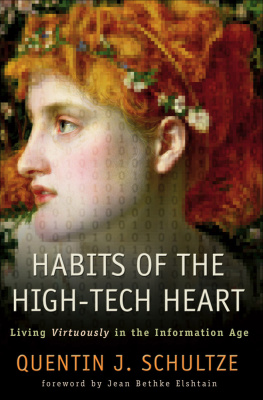



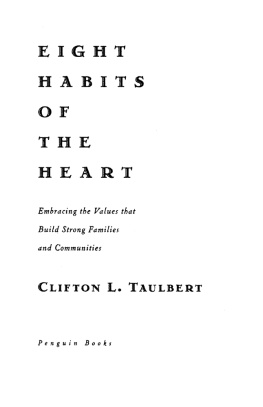


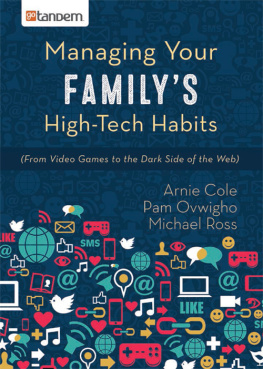
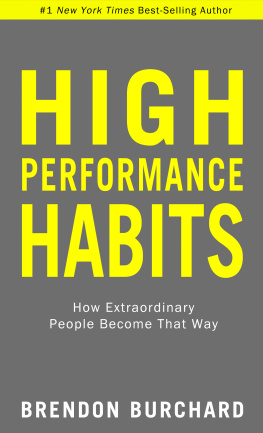

 We live in parlous times. Before the terrorist attacks of September 11, 2001, we were told repeatedly that a glorious new age of technological advance and discovery lay before us. I recall vividly participating in a discussion on the Lehrer News Hour on public television with a gentleman who had made his millions in a dot-com start-up company. When I raised the matter of a growing gap between those who are full-fledged members of the cyber-revolution and those who are being left behindas people are always left behind when new technologies take holdhis expression was one of bemusement and disdain. Clearly, I was a fuddy-duddy who wanted to stand in the way of unstoppable progress. Utopian rhetoric flowed like punch at a junior prom: The new technology would, within a short period of time, cure cancer, solve traffic jams, and usher in an era of world peace. The list seemed a bit odd, especially the world peace part. But, not to worry, the cyberage enthusiast continued, for the elements were already there. People in the global village would be bound together by consumer products. Everybody wants brand names, and this loyalty to and enthusiasm for brand names would bind people together in a way that would trump such atavistic urges as nationalism.
We live in parlous times. Before the terrorist attacks of September 11, 2001, we were told repeatedly that a glorious new age of technological advance and discovery lay before us. I recall vividly participating in a discussion on the Lehrer News Hour on public television with a gentleman who had made his millions in a dot-com start-up company. When I raised the matter of a growing gap between those who are full-fledged members of the cyber-revolution and those who are being left behindas people are always left behind when new technologies take holdhis expression was one of bemusement and disdain. Clearly, I was a fuddy-duddy who wanted to stand in the way of unstoppable progress. Utopian rhetoric flowed like punch at a junior prom: The new technology would, within a short period of time, cure cancer, solve traffic jams, and usher in an era of world peace. The list seemed a bit odd, especially the world peace part. But, not to worry, the cyberage enthusiast continued, for the elements were already there. People in the global village would be bound together by consumer products. Everybody wants brand names, and this loyalty to and enthusiasm for brand names would bind people together in a way that would trump such atavistic urges as nationalism.